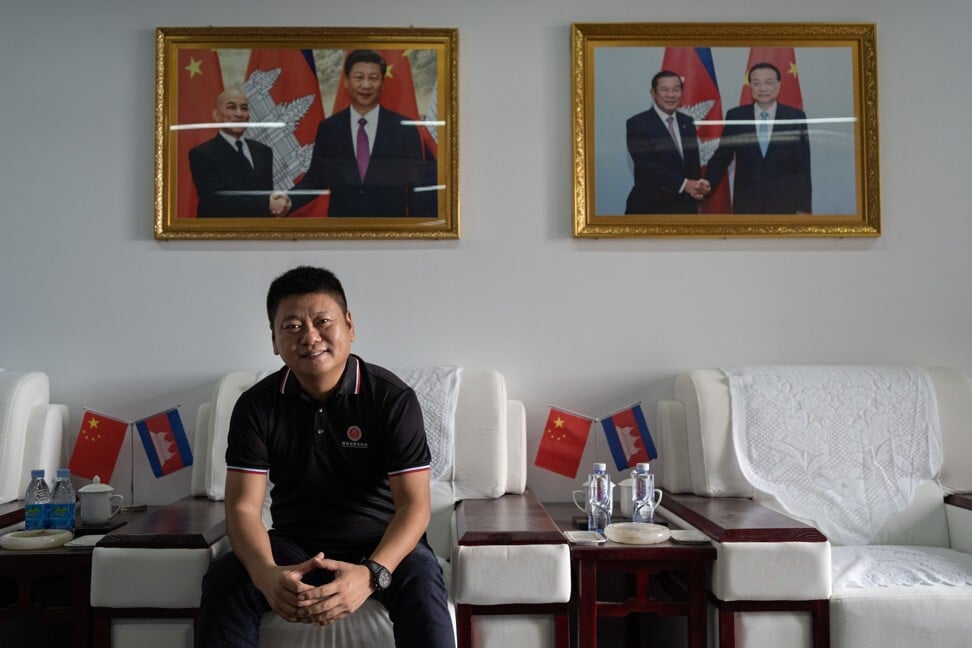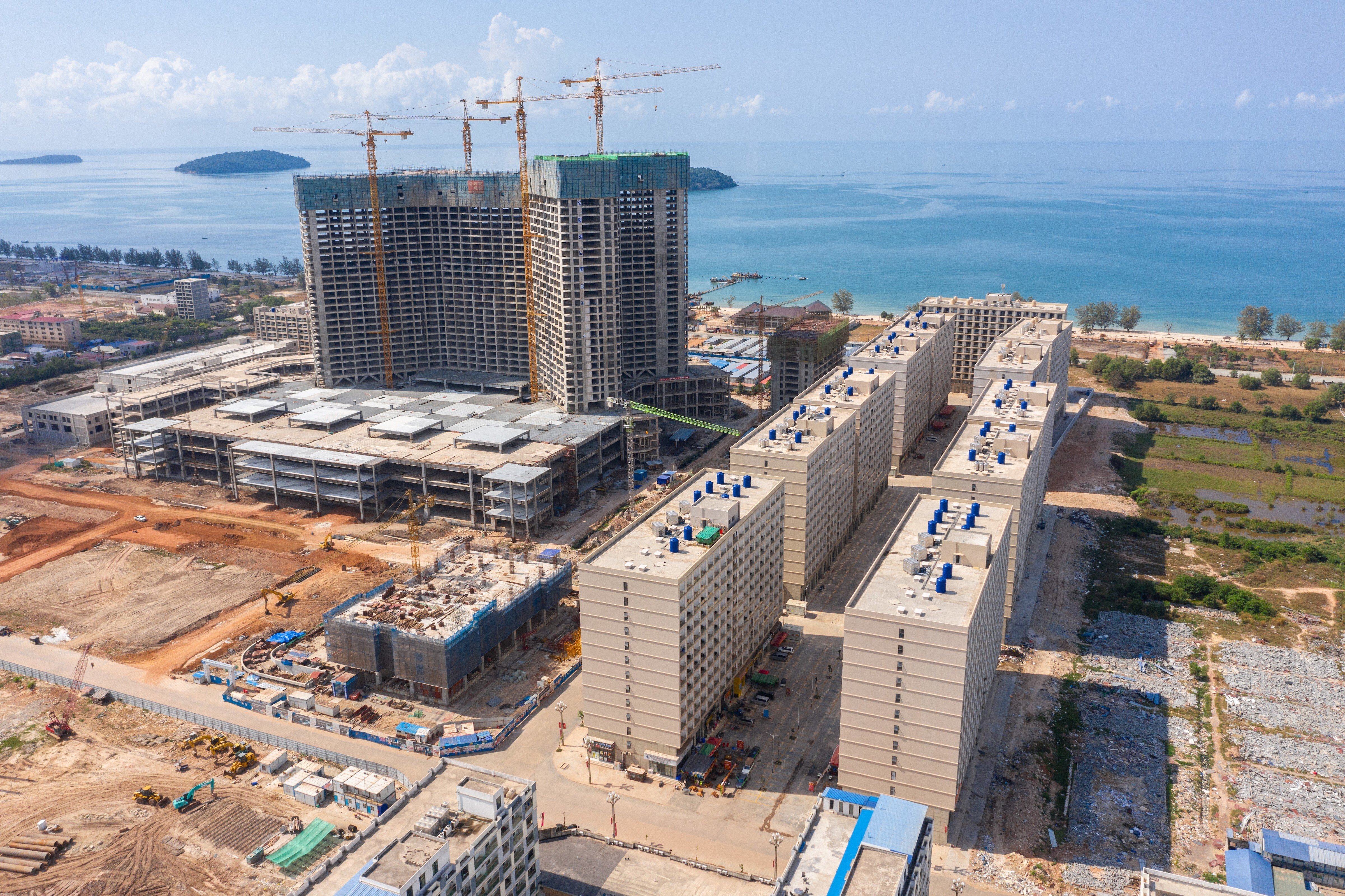
- Thousands of Chinese construction workers left unpaid and stranded as work on half-built Chinese casinos comes to a halt following August ban on online gambling
- A federation of Chinese businesses has been created to help those affected by the fallout, but there is only so much it can do
After passing through loose security at the entrance of WM Casino, in neon-flashing downtown Sihanoukville, the floor opens onto a dozen or so smiling women in tight black dresses, at Vegas-style, green-felt gaming tables. They deal cards in view of webcams, while on a nearby monitor, online avatars of remote gamblers appear to be placing bets.
Towards the back of the casino, a floor manager overseeing the operations from a glass-walled room emerges and quickly denies they are providing online gambling for players outside the casino.
“We absolutely don’t do any online gambling,” he insists, saying the system on view is a closed circuit, meant to serve players at other locations in the casino.
Why any gambler in the vicinity wouldn’t play at the table is unclear. Further inquiry only leads the man, smiling politely, to say: “We don’t have to explain things to you. If you stay longer, I’ll call the police.”
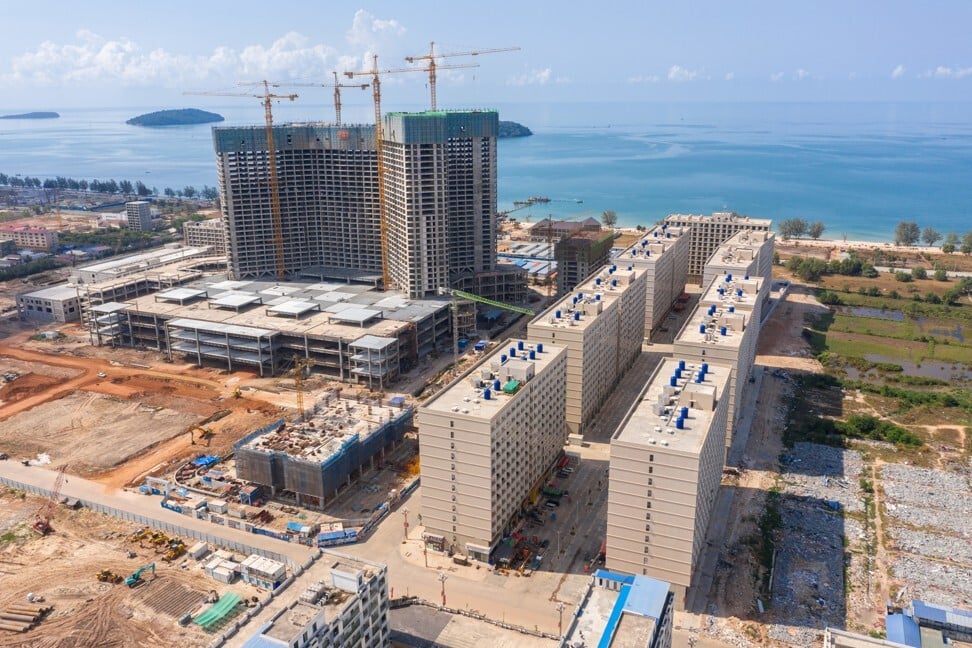
That may be his right, but if his “closed circuit” story is as disingenuous as it sounds, and what looks like remote online gambling is, in fact, remote online gambling, the manager would have other legal worries.
A polite man dressed in black – from trousers to T-shirt to hair – Chen, 44, explains things in detail and in measured language. He says that after a business meeting in Vietnam four years ago, he decided to cross the border for a few days, just to see what it was like.
Unlike the heavily controlled markets in China, Cambodia’s economy functioned largely in US dollars and with lax regulations, and Chen quickly saw potential for investment. Chinese investors wanting to keep assets in a globally tradeable currency could easily do so in the tiny Khmer kingdom. Chen says it has been “easy to make money in Southeast Asia. [We businessmen] wondered if we were doing something wrong in our investments in China, then learned we have to pay attention to new and emerging markets”.
Sihanoukville’s untapped adjacent opportunities did not go unnoticed, and private Chinese investors flocked to the city to build hotels and casinos. These would, among others, accommodate Chinese customers – both those who may have arrived in the city as Belt and Road workers and tourists not allowed to gamble back home. (Gambling is also illegal in Cambodia, but only for its own citizens.)
But now, because of the ban, thousands of the Chinese who came to Cambodia and made their money in gambling have left. After years of Chinese investment pouring into developing countries, Sihanoukville has become an unfortunate example of what happens when that money pulls out. Almost 30 casinos in Sihanoukville have closed or suspended employment of all staff except security guards, and another 33 have temporarily suspended staff, a labour ministry official told local media outlets.
Multiple videos uploaded to YouTube show online gambling continuing at WM Casino even after the ban was implemented on January 1. With powerful backers, it seems, WM Casino is well-placed to carry on its online gambling business. Parent company Lixin Group is closely affiliated with Hun Sen’s nephew, Hun To, and its subsidiary, Lixin Development, lists Hun To as a director. The political scion has been embroiled in a series of controversies before, including alleged involvement in a shooting incident in Phnom Penh and being accused of drug smuggling and money laundering.
WM is not the only casino openly defying the online gambling ban. A few hundred metres down the torn-up, dusty road, under construction with open sewage canals flanking its sides, GoBo East Casino also appeals to the rich: luxury cars are parked in front of its golden-lit entrance with high ceilings and an opulent water fountain.
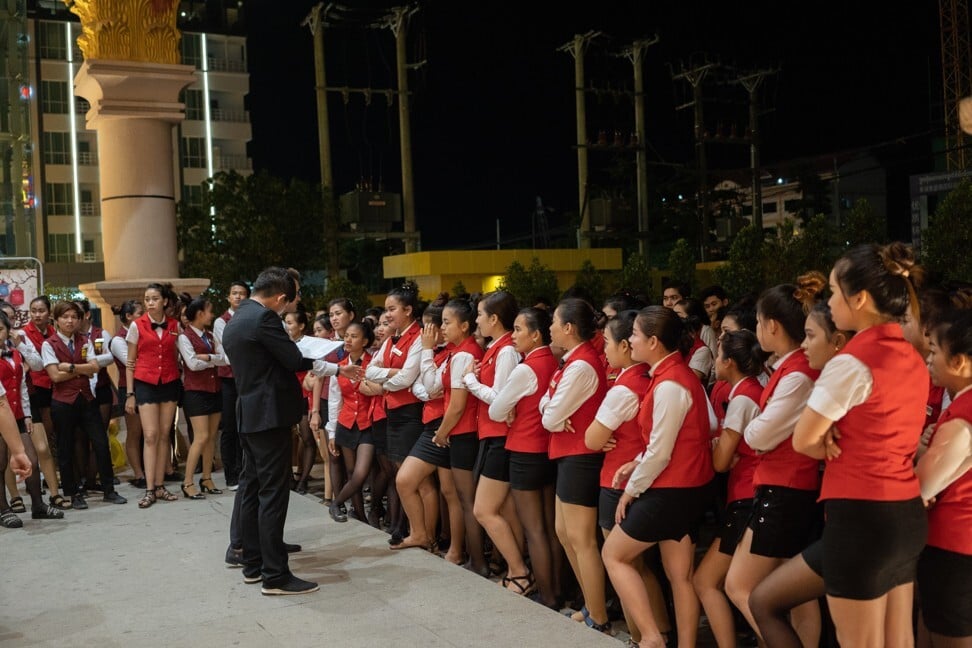
On a recent evening, eight women stand towards the end of the gambling hall, hair up, short, tight dresses revealing décolleté for the gamblers watching them from the other end of a webcam. They deal cards slowly, deliberately. One of them seems to be waiting for the game to begin, standing alert but still, as a Khmer-looking woman in a casino uniform patrols behind.
As with WM, connections to high places are not hard to find. Deputy Prime Minister Men Sam An officially opened GoBo East in April 2018, and while the casino management could not be reached for comment, a website bearing its logo – illegal ventures mean ever-changing URLs – offered online gambling as of the end of last month.
To another casino manager in Sihanoukville city centre, who spoke on condition of anonymity, the Chinese investment withdrawal comes as no surprise.
He says he worked in the gambling industry in Myawaddy, in Myanmar, near the Thai town of Mae Sot, for about a year. Relatively easy-to-get Thai visas for Cambodians meant he could stay in Mae Sot and cross into Myanmar every day for work.
He started his Sihanoukville gig as casino manager about six months ago, and has seen a significant decline in business, he says. While his floor initially hosted about 70 or 80 gamblers a day, now that number has fallen to about 10 – and they spend far less. (Those who are Cambodian seem not to be arrested for illegal activity.)
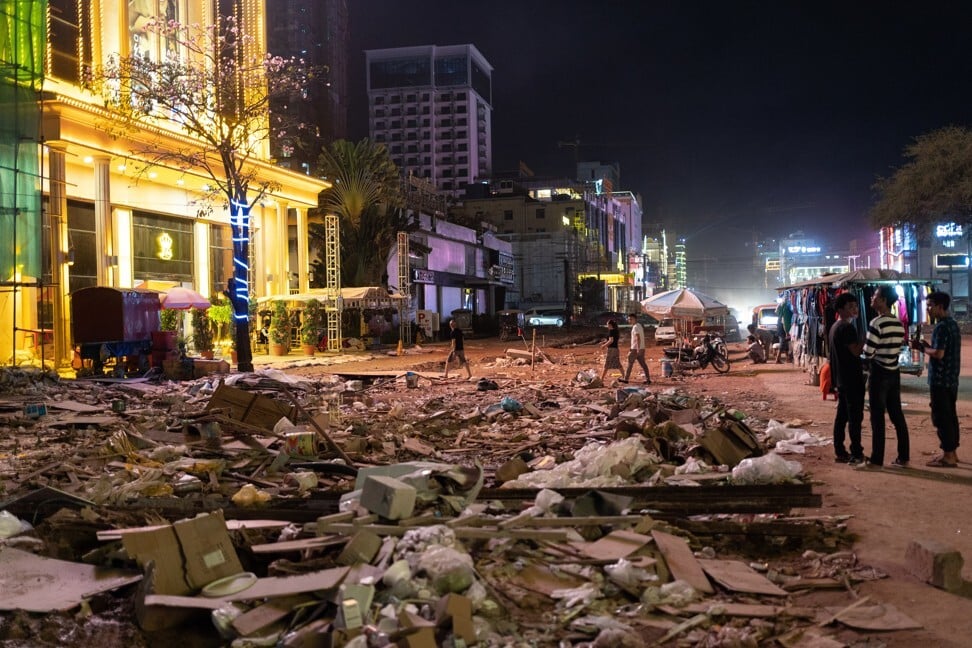
The most profitable floor in his three-storey casino used to make about US$600,000 a day, he says, but since the ban was announced that has fallen to US$100,000. With US$300,000 in daily expenses, operations are no longer sustainable, and he says the casino might soon close. Already, dozens of cables stick out of the floor where gaming tables once stood.
A few doors down, in one of the main downtown casino hubs, another establishment has recently closed. Manager Li says that while the ban on online gambling had dented profits, the casino went into debt when the road outside was torn up for repair work.
In a push to improve Sihanoukville’s infrastructure, Hun Sen allocated US$100 million for road repairs last September and announced a US$300 million project to build 33 roads and bridges in the province. But the repair works mean that in order to reach many casinos, customers have to step over gravel or walk narrow planks that serve as makeshift bridges over open sewage systems. In December, the casino was in debt by US$500,000, says Li.
“People have left for Myanmar, Laos, Malaysia and Dubai,” he says. “They are taking their business there.”
With a “Merry Christmas” sign still on its wall, the casino ended its operations on January 7.
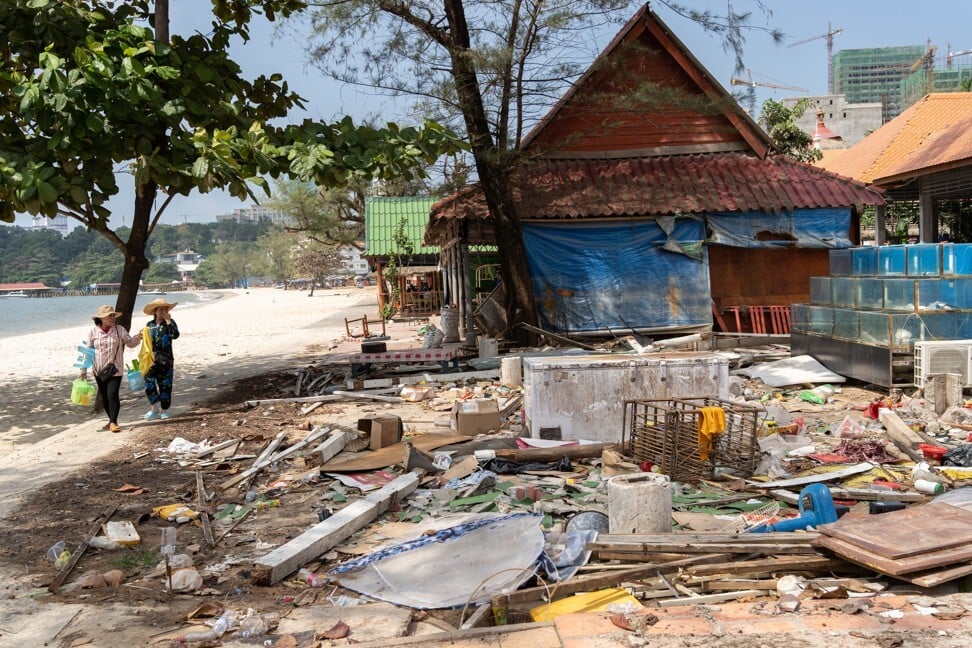
With the ballooning and subsequent decline of the gaming industry, hundreds of restaurants have been forced to close, too, many proprietors also returning to China.
According to statistics provided by Chen’s federation, as of late last year the number of restaurants in Sihanoukville had fallen from 1,372 prior to the August 18 announcement to just 579, and shops in the city centre that would usually rent for between US$600 and US$800 a month were now fetching US$200 to US$300.
Chen says that while initially about 50 to 60 per cent of restaurants made profits, this had fallen to about 5 per cent in January.
An NGO worker, who wished to be identified only by his first name, Chamroeun, says he struggled to pay back the bank loans he had taken out to build a house that he had intended to rent to Chinese businesspeople.
But those who have really felt the blowback from Chinese money pulling outare the thousands of Chinese construction workers who followed their compatriots’ investments.
At Chinese company Li Sheng’s abandoned construction site in Sihanoukvillewe talk to a local security guard, who wishes to remain anonymous. He says he used to be a construction worker at the site – work that he has not yet been paid for. He says he is owed US$500, and “tried to find a new job but it’s not easy because there aren’t many people around any more”.
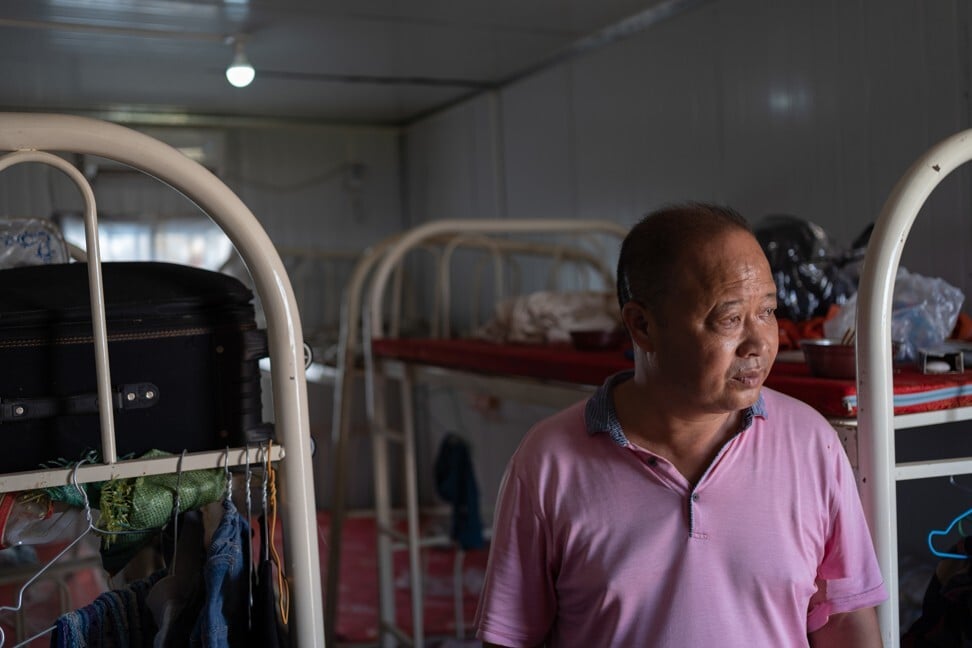
A kilometre further west, sitting in another abandoned construction site, 49-year old Jong, a Chinese worker who asks to be identified only by his last name, explains how work ceased a few months earlier, when the investor stopped paying the construction company.
“Nobody can afford to go home,” says Jong. “We haven’t been paid.”
This weighs especially heavy on him: his mother, who lived in China, died recently. “She passed away and I cannot fly home … We were really close,” he says.
The situation at his work site was made more precarious when the government started roadworks nearby and cut off the water supply. As he and his fellow workers lived on site, they did not have water to wash their clothes, he says. And with no salary, barely anything to eat.
At the Li Sheng site, some Chinese construction workers live in the abandoned building complex. Like Jong, they cannot afford to fly home.
Li Sheng pulled out in September, soon after the August 18 ban, which the Chinese community often refers to as “818”. Foreman Zeng Xinjian says the company owed workers about US$4,000 each – a total of about US$40,000 to US$50,000.
“They are liars,” Zeng says, referring to the company owners’ promises to settle the dues. “Once they cracked down [on online gambling], they fled.”
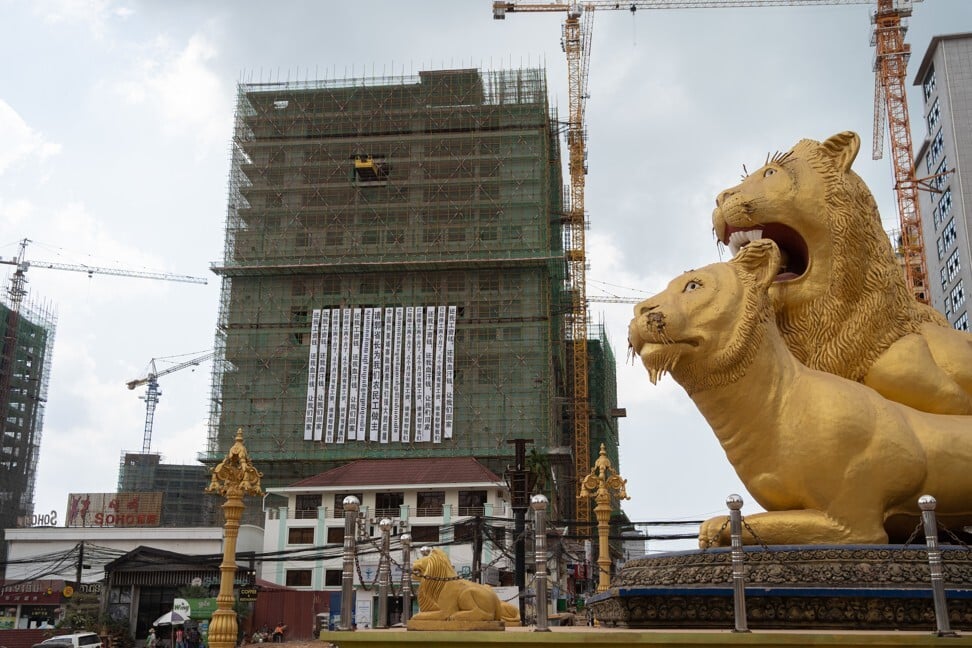
He and the other workers survive on a US$5 daily allowance they receive from a charity organisation from Sichuan province that assists Chinese in Sihanoukville.
“Because we’re associated with gambling,” he says of an attempt to contact the Chinese embassy, “they said they are not going to help us.”
But while he is angry with the company, he says he approved of the move to ban online gambling, because of the harm it causes to society.
Visibly upset, Zeng’s 38-year-old wife, Xiao Yu, says the whole experience has been a disappointment since they came to Cambodia in July 2018.
“If we leave, we won’t get any money,” she says. “We’re owed so much money, once we leave we’re never coming back.”
The evening after Post Magazine visited Li Sheng’s site for the first time, security personnel were posted to prevent visitors from climbing the skeleton building higher than the third floor. On the fourth and fifth floors, rooms had been rented out to two casinos for US$350 each – reduced from US$800 in June, according to a worker on site.
A Li Sheng representative, who during a second visit arrived in a car without a licence plate, refused to answer questions or give his name, and accompanied by security guards ordered reporters to leave the premises.
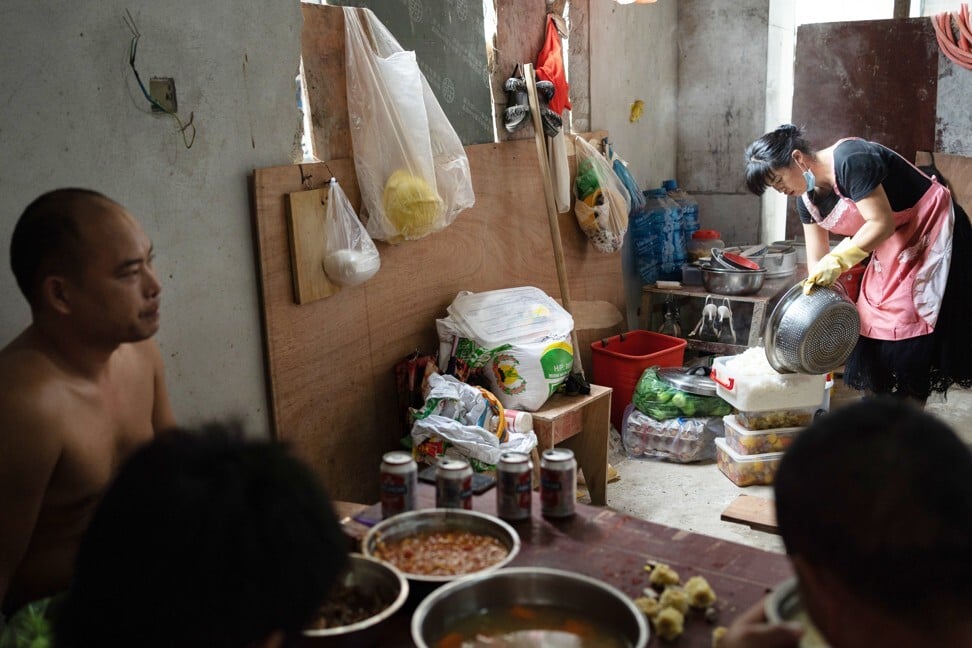
It’s not only unpaid wages that keep Chinese workers from returning home. Chen says most companies kept their workers’ passports to prevent them from leaving.
In an interview at his office in Sihanoukville, Chen says he and other Chinese businessmen created the federation at the beginning of November when it became clear that hundreds of compatriots were in need of help.
But for Wang Jing, director of Golden Skill Construction and Renovation, it was a matter of convenience and security for the workers, who, he says, volunteered to hand over their passports. About 80 to 90 per cent of his Chinese workers, he says, opted to keep their passports with the company. In return, the company kept the documents safe. “We trust them and they trust us,” he says.
He estimates that there were a total of 50,000 to 60,000 Chinese construction workers in Sihanoukville, and although two of Wang’s workers told Post Magazine of their good experience with the company, this does not appear to reflect the reality of many employed by other firms.
It does not take long to find cases on a Chinese-language forum for Sihanoukville, for example, of Chinese citizens asking for advice on how to return home when their passports are being held by employers. With no passports, workers are also unable to renew their visas.
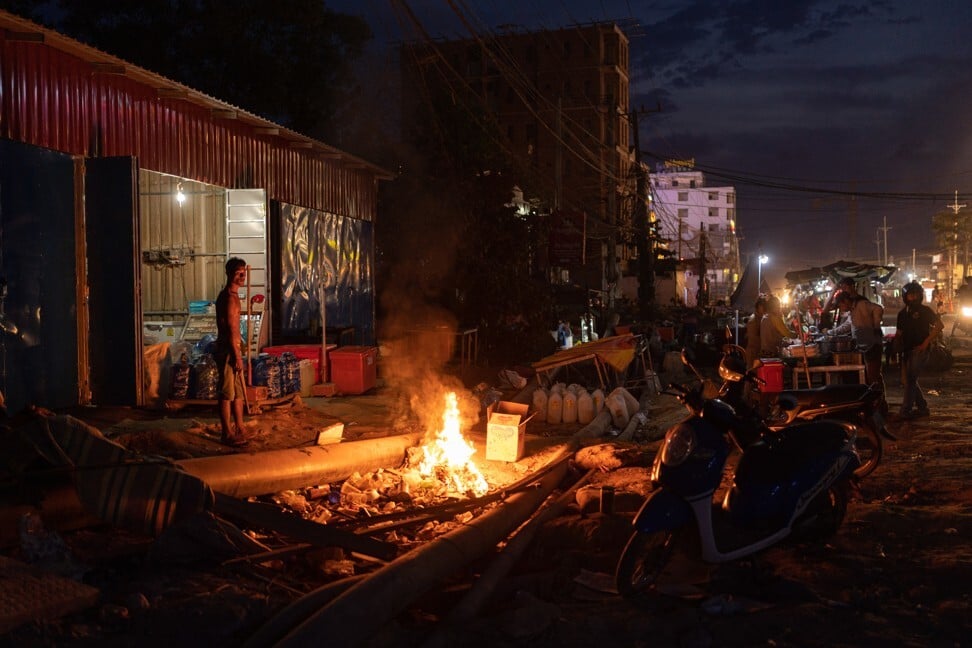
Overstaying their visa in Cambodia attracts a fine of US$10 a day. Many workers, Chen says, have overstayed their visas by several months, which by far exceeds the cost of flights to China. He says his organisation can provide for the latter in certain cases, but covering the fines for overstaying visas has proven too costly.
According to data provided by Chen, his federation has helped in 126 cases, negotiating with employers to pay workers some of the US$10 million in outstanding wages, organising flights home and paying out more than US$30,000 in visa-overstay fines
Other provincial organisations, according to statistics provided by Chen, bought plane tickets for more than 150 Chinese citizens to return home. And although they had worked on 160 cases, Chen says, “that is, of course, not the entire number”.
He says the two most common cases involved company owners abandoning the work site without paying workers’ wages, or foremen taking the money and leaving, or spending it in the casinos instead of paying workers.
Chen says people have exploited the easy immigration rules for Cambodia. “The Chinese come here to chase the economic bubble, and it’s too easy to come here,” he adds.
Sitting in the spacious meeting room of his office, which boasts big white armchairs separated by side tables on which stand miniature Cambodian and Chinese flags, Chen insists he loves the Khmer kingdom despite its difficulties. But reflecting on how the burden of picking up the pieces when the bubble burst fell on Chinese businessmen like him, he shrugs, muttering, “It’s a disaster.”


